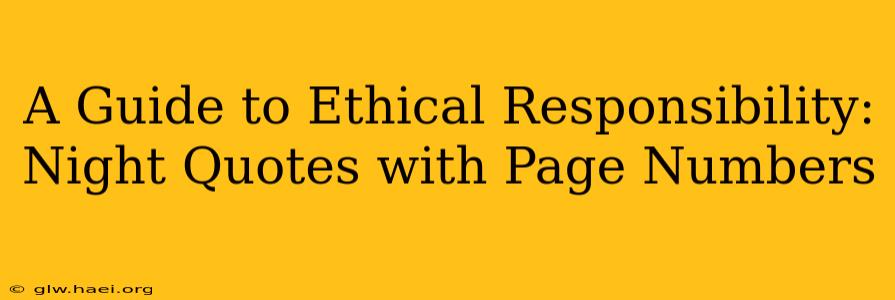A Guide to Ethical Responsibility: Night Quotes with Page Numbers
The chilling narrative of Elie Wiesel's Night isn't just a historical account of the Holocaust; it's a profound exploration of ethical responsibility in the face of unimaginable cruelty. Wiesel's powerful prose forces readers to confront the complexities of human nature and the enduring questions of morality. This guide delves into key quotes from Night, exploring their ethical implications and providing page numbers for reference (note that page numbers may vary depending on the edition).
Understanding the Ethical Landscape of Night
Before we dive into specific quotes, it's crucial to understand the ethical framework within which Night operates. The novel doesn't offer simple answers; instead, it presents a morally ambiguous world where survival often necessitates compromising one's ethical principles. Wiesel's experiences challenge us to grapple with questions of:
- Individual responsibility: How far should one go to survive in the face of overwhelming oppression? Where does self-preservation end and complicity begin?
- Collective responsibility: What role did the bystanders play? What is the responsibility of a society that allows such atrocities to occur?
- The nature of good and evil: Does the existence of absolute evil diminish the importance of individual acts of goodness? Can goodness even flourish in such circumstances?
These questions are interwoven throughout Night, making it a potent text for exploring ethical dilemmas. Let's examine some key passages:
"Never shall I forget that night, the first night in camp, that turned my life into one long night, seven times cursed and seven times sealed. Never shall I forget the smoke. Never shall I forget the little faces of the children whose bodies were turned into wreaths of smoke beneath a silent blue sky. Never shall I forget those flames that consumed my faith forever." (Page 34)
This powerful opening passage sets the stage for the ethical struggles to come. Wiesel's inability to forget underscores the lasting impact of witnessing such horrors. The ethical question here is the responsibility of memory: How can we remember and prevent future atrocities while avoiding the paralyzing effects of trauma? The destruction of faith highlights the challenge to maintain ethical principles when faced with the systematic destruction of humanity.
"The world was silent. It was as though the earth had been struck dumb." (Page 35)
The silence of the world underscores the collective responsibility. The absence of intervention from the international community raises serious ethical questions about the failure to prevent genocide. It forces us to consider our own responsibilities as citizens of the world to speak out against injustice and prevent future atrocities.
"The more I live, the less I understand the world." (Page 118)
This quote reflects the existential crisis faced by many survivors. The sheer brutality of the Holocaust raises profound questions about the meaning of life, the nature of God, and the possibility of finding ethical meaning in a seemingly meaningless world. This sentiment compels readers to reflect on their own search for meaning and ethical purpose.
"From the depths of the mirror, a corpse gazed back at me." (Page 119)
This stark image highlights the dehumanization experienced in the camps. The loss of identity and the reduction of individuals to mere numbers represent an extreme violation of ethical principles. It reminds us of the importance of preserving human dignity, even in the face of unimaginable suffering.
What is the significance of Eliezer’s relationship with his father in the ethical context of the book?
Eliezer’s relationship with his father forms the moral center of the narrative. It showcases the struggle between self-preservation and filial piety within the extreme context of the camps. While survival instincts often clash with his ethical obligation to care for his father, their bond underscores the importance of human connection and empathy, even amidst horrific conditions. The ultimate loss of his father emphasizes the devastating consequences of dehumanization and the ethical imperative to protect the vulnerable.
How does Night portray the role of faith in the face of extreme suffering?
Night is not just a physical descent into hell, it's a spiritual one. Wiesel's profound loss of faith mirrors the experience of many survivors who grappled with the apparent absence of a just and merciful God in the face of the Holocaust’s systematic evil. This challenges readers to confront their own beliefs and consider the relationship between faith, suffering, and ethical responsibility. The absence of a comforting divine presence doesn't negate the importance of ethical behavior; instead, it places the burden of morality squarely on the shoulders of humanity.
By confronting these questions, Night provides a powerful and enduring lesson on ethical responsibility. It reminds us that remaining silent in the face of injustice is a form of complicity, and that individual actions, however small, can have profound ethical consequences. The enduring power of Wiesel's work lies in its ability to challenge us to actively engage with these questions and to strive towards a world where such horrors are never repeated.

